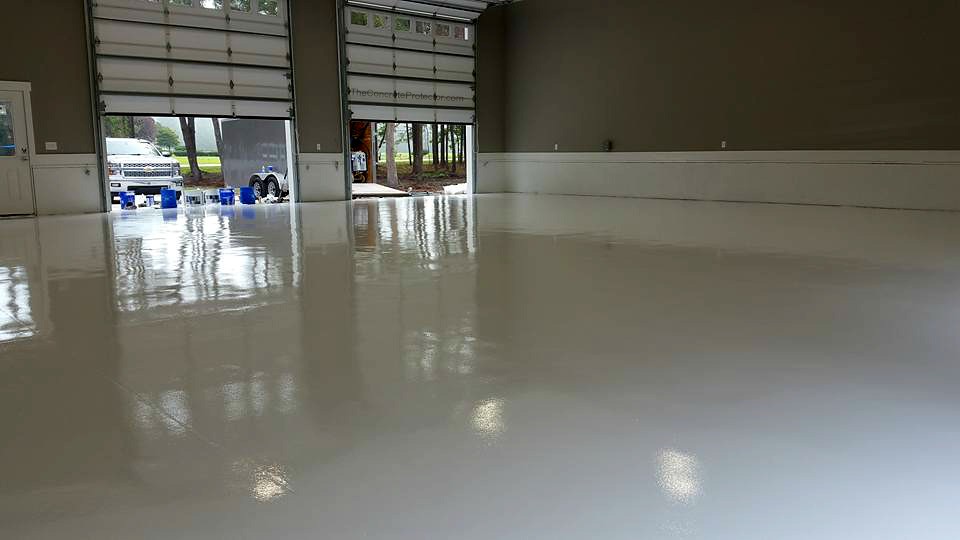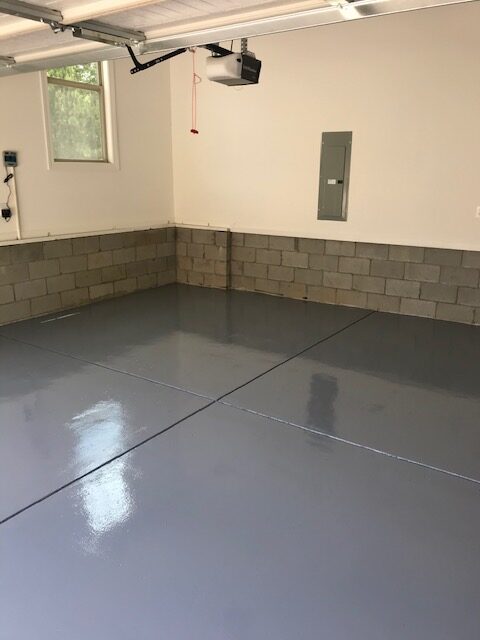Pioneer Floor Epoxy – Columbia SC Floor Epoxy & Stained Concrete
Pioneer Floor Epoxy – Columbia SC Floor Epoxy & Stained Concrete
Commercial & Residential Epoxy Flooring

Commercial & Residential Epoxy Flooring

**Fill the Form or Call for a Free Onsite Consultation & Quote
Contact Us for a Free Quote
**We try and get back to inquiries in minutes, to within the hour (M-F).
Epoxy flooring is a system of resinous materials that are applied directly over concrete to provide a durable and attractive surface. It’s typically found in garages and commercial buildings, but it can also be used in residential applications. Epoxy flooring creates a hard, glossy finish that is resistant to staining, water damage, and wears.
Epoxy flooring typically consists of two components: an epoxy resin and a hardener. The resin and hardener are mixed together just before application so that they form a strong bond when they dry.

Epoxy flooring is a popular choice for garage floors for many reasons. It offers superior durability and can resist scuff marks, staining, and chemicals that are commonly found in garages. The installation process is fairly simple and the materials come in varying colors and styles so you can customize your design.
With epoxy floor coating, you also get long-lasting protection from wear and tear. This makes cleaning up grease, oil spills, and other liquids much more manageable. Additionally, because it doesn’t require grout or mortar to be laid down as traditional tile flooring does, the overall cost of installation will be lower. Plus, with the right maintenance schedule, an epoxy-coated garage floor can last up to 15 years—that means a lifetime of beautiful use!
Epoxy flooring is becoming increasingly popular for garage floors due to its many advantages. The first advantage is that epoxy flooring is highly durable and resistant to wear and tear. It is also highly chemical and stain-resistant, making it easy to clean and maintain over time. This flooring option is slip-resistant, adding an extra layer of safety for those working in or visiting the garage space.
Epoxy flooring is also customizable in terms of color and design, allowing you to create a unique look for your space. In addition, epoxy flooring provides better insulation than other types of flooring which helps keep the garage cool during hot summers.
Finally, epoxy flooring is relatively easy to install, meaning fewer labor costs overall compared to other options. For these reasons, epoxy flooring has become a go-to choice when it comes to creating a functional and aesthetically pleasing garage floor.
Epoxy flooring offers a great long-term solution, however, it can require extensive preparation of the existing surface to ensure the epoxy adheres properly. Without this preparation, the epoxy may not be able to bond with the surface, leading to premature cracking or peeling.
In order to prepare the existing surface, any existing coatings such as paint or sealers should be removed prior to installation. The surface should also be thoroughly cleaned and dried before laying down any epoxy product. A scouring pad or grinder may need to be used in order to remove dirt, grease, oil and other substances which could interfere with proper bonding. Any damages created during this process must be repaired before applying the epoxy coating.
Finally, an etching primer may need to be applied in order for the epoxy coating to adequately adhere; this will provide a better overall finish and prevent delamination. By preparing the existing surface prior to installing epoxy flooring, businesses and homeowners can expect long-lasting results that will stand up against heavy foot traffic or industrial use.
Installing epoxy flooring can be a daunting task, especially if you are unfamiliar with the process. The first step is to properly prepare the concrete surface that you are covering in epoxy. This involves using an etcher to remove dirt and impurities from the surface and creating a profile for the epoxy to better adhere to. Once the etching is complete, it is important to clean up any debris and dust before applying a primer coat. Depending on your chosen product, this may require multiple coats of primer.
Once all of the prep work is done, it’s time for the actual installation of the epoxy flooring itself. You will typically need to mix together two components—an activator and base—in order to create a liquid solution that can then be poured onto your concrete surface. After it has been poured, you will need to spread it evenly and let it dry for around 24 hours before applying additional layers. This process needs to be repeated as many times as necessary based on your chosen product specifications.
In total, it can take up to 48 hours for epoxy flooring to fully cure and harden into its intended form, so make sure you plan accordingly when deciding on a timeline for installation!

Under some conditions, epoxy flooring can be prone to moisture damage.
Epoxy flooring is a reliable and durable option for floors, however, it can be vulnerable to water or moisture damage if not applied correctly and taken care of properly. Although epoxy is water-resistant, it does not offer complete waterproof protection; gaps in the surface can let liquid seep through, leading to harm.
Extremely high humidity or excessive amounts of water can cause the material to peel away from the base, resulting in significant destruction. Fortunately, epoxy flooring may be designed to be more resistant to water deterioration by adding extra layers, coatings, or other substances to make it more sheltered against wetness. Additionally, prior to fitting the epoxy flooring, any existing moist spots should be attended to in order to prepossess potential impairment.
Caring for your epoxy floor by regularly cleaning it and reapplying protective stages can aid in preventing harm due to water or moisture as well. To summarize, epoxy floors may suffer from moisture damage but with proper installation and upkeep, this kind of devastation can be prevented or contained.
Epoxy flooring is a great solution for commercial, industrial, and residential spaces due to its remarkable resistance to staining and discoloration. The non-porous surface of epoxy flooring makes it less vulnerable than other materials like concrete or carpet. Moreover, this type of flooring can tolerate ultraviolet radiation which makes it suitable for outdoor applications.
Despite the advantages of epoxy flooring, certain chemicals or liquids such as oil or gasoline can cause discoloration if left untreated. To preserve the original appearance of an epoxy floor, timely cleaning, and adequate care are necessary. Thus, while epoxy offers excellent protection against staining and fading, proper maintenance is still essential to ensure long-lasting results.
Epoxy floors can become very slippery when wet or greasy and this is one of the main drawbacks of epoxy floors. When an epoxy floor gets wet, the water that remains on it will mix with any grease or dirt present, creating a slippery coating. This can create a slip hazard for those walking on it and can even lead to accidents if proper caution isn’t taken.
The same holds true for greasy substances such as motor oil that may be spilled onto the floor: If not cleaned up immediately, it will create a very slippery surface. To overcome these issues, epoxy floors should be treated periodically with a non-slip additive or painted with a non-skid coating.
Epoxy flooring typically requires minimal upkeep, yet in some cases it can be more difficult to maintain. Improper application or inadequate substrate preparation can cause peeling and delamination over time, while exposure to harsh chemicals and extreme temperatures can damage the coating.
Nevertheless, regular sweeping, vacuuming, mopping and scrubbing will keep epoxy flooring looking its best. With proper installation and maintenance, any challenges associated with keeping epoxy floors in good condition can be easily overcome.
Epoxy flooring can be difficult to repair because it is a highly durable material. It is a combination of resins and hardeners that have been blended together to create a solid material that is highly resistant to wear, staining, heat, and chemicals. As such, any damage that does occur to the surface of the epoxy flooring must be carefully addressed in order for the repair to last for a long time.
Additionally, any repairs often take additional materials and expertise as well as specialized tools in order to properly complete the repair job. This means that repairs not done by professionals may not hold up over time or may look mismatched compared to the existing flooring.
If you’re looking to improve your home, investing in professional epoxy flooring installation can make a world of difference. This durable flooring material is waterproof, easy to clean, and adds a great deal of aesthetic appeal. Our experienced professionals at Pioneer Floor Care can install epoxy floors in any room of your house, giving it an elegant and modern look that will be sure to impress.
We understand how important it is for your floors to look good, and we take pride in providing top-notch services so you can be sure you’ll get the results you want. Additionally, our team uses only high-quality materials for all our installations, ensuring that the end product is both long-lasting and beautiful. With epoxy installation from our team at your disposal, you’ll have floors that won’t just look great but also last for years to come.
Call Us Now
**During normal business hours we usually respond within minutes to within the hour to your email inquiries.
We also offer industry leading fast turn around times on site visits and project assessments.
Onsite consultaitons and detailed written price quotes are FREE.